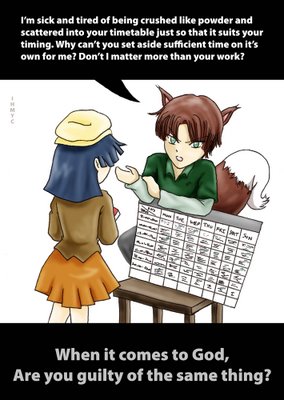Sin.
No one is free from sin, all of which start with lies. Satan's the Father of Lies. Every sin is founded on at least one lie. You think that you will have a certain satisfaction from committing the sin but it's actually not true, it's a lie. One example is people who watch pornography - "Everyone's watching it, I HAVE to watch it too to be in the in crowd."
S-I-N.
What's in the middle of sin? You're in the middle of sin. When you sin, you focus on "my joy, my happiness". You become the centre of your life, the centre of the world. That's not how we should live. We should be like Christ - He thought of others all the time, he was "others-centred" and not "self-centred". So were the martyrs and saints. Always remind yourself, my needs and my desires are not the most important things. Always give, share and care for others.
Prayer is communication with God. Each of us is so unconditionally loved by God, we get this unshakable foundation and we don't need to turn to other things in order to get that sense of belonging with God. But, not everyone can feel this unconditional love. They will habitually sin to substitute for it - they drink excessively, they take drugs, amongst other sins, just to tell themselves "I love myself" because they don't know God loves them unconditionally. Let's prevent this and spread this unconditional love from God to the people around us, especially to those we catechize.
Nowadays there's poison in families. Children grow up with the thinking that they're not lovable, they need to show their talents to be loved. In other words, they have no/little realization of God's love for them. In school, it's the same thing. The kids have to have a certain criteria before they're allowed entry into "elite" groups of friends. The poison spreads from home to school. So many of the young we teach are caught in this poison river. But how many can actually get out?
God's unconditional love gives you
security and confidence. They're not things every 14/15 year old has, in fact maybe only about 0.05% of them have it. These kids know their place in the world. They be the best son/daughter/boyfriend/girlfriend and they know they're at their best. But those who don't recognize God's love, they will be insecure and needy. "Please please please, love me?" Find these people and teach them to recognize God's love.
When secure and confident people come together, they radiate positive energy. They bring joy and are comfortable to be with. For these people, God is at the centre of their lives. If they're not members of the faith, then at least
LOVE is at the centre of their lives. They know they're cherished by God, and this is the antidote for the poison in the river. The knowledge that you are cherished and loved by God unconditionally.
This knowledge and the security and confidence that comes along with it will lead you to fulfil your fullest potential, and that's to be a SAINT! The greatest tragedy is when you're not in a saint (you're not in heaven). You haven't reached your highest potential.
Reach out to fulfil your potential and be a saint. Join God in his party with the Father and Holy Spirit. :D Be part of his life.
